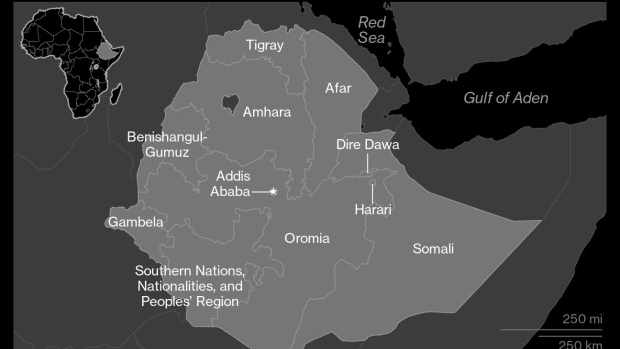Nov 10, 2020
Ethiopian Police Drawn Into Nation’s Deepening Ethnic Strife
, Bloomberg News

(Bloomberg) -- Civil strife in Ethiopia has taken a new twist, with police officers standing accused of targeting ethnic Tigrayans in Addis Ababa, the capital, over recent days.
Two residents and a municipal official, who spoke on condition of anonymity because they feared repercussions, said they had direct knowledge of Tigrayans being rounded up and detained. There were similar reports on social media. The development has coincided with seven days of fighting between government troops and forces loyal to the Tigrayan People’s Liberation Front, which rules the northern Tigray region.
A Tigrayan reporter who covers the region for the Addis Standard, an independent, Addis Ababa-based newspaper, was among those apprehended on Nov. 7, according to its editor Tsedale Lemma. He was taken to court and accused of “attempts to dismantle the constitution through violence,” while armed security guards had come to the newspaper’s office, she said. The reporter was released on Tuesday.
“They knew our reporter is an ethnic Tigrayan,” Tsedale said. “I cannot separate his work from his identity.”
Jeylan Abdi, the federal police spokesman, didn’t respond to questions about the spate of detentions. On Nov. 7, Addis Ababa Mayor Adanech Abebe confirmed the arrests of 10 unidentified city officials in the capital, accusing them of “terrorist activities.” He has subsequently requested members of the public to identify people they suspect of being TPLF members or supporters.
Relations between Tigray and the federal government have been strained since Prime Minister Abiy Ahmed took office in 2018 and sidelined the TPLF, once the pre-eminent power broker in Ethiopia. Last month, the federal parliament ordered the Treasury to halt direct budgetary support to the Tigrayan administration for defying an order to postpone regional elections.
Clashes ensued after Abiy ordered the army to respond to an alleged attack on a federal military camp in Tigray. The violence has stoked concerns about a broader war at a time when the government is struggling to end ethnic violence shaking Africa’s second-most populous country. The fears were born out on Tuesday by state media reports that special forces had carried out operations against the Oromo Liberation Army, an anti-government group that broke away from the Oromo Liberation Front last year and is conducting a violent campaign in the Oromia region.
With most telecommunications to the Tigray region cut off, an accurate picture of the number of casualties and the damage caused by the fighting there has been hard to come by.
“Our law enforcement operations in Tigray are proceeding as planned,” Abiy said on Twitter on Tuesday. “Operations will cease as soon as the criminal junta is disarmed, legitimate administration in the region restored, and fugitives apprehended and brought to justice -- all of them rapidly coming within reach.”
The yield on Ethiopia’s $1 billion of 2024 Eurobonds dropped six basis points on Tuesday to 7.52%, paring its increase since Nov. 3 to 112 basis points.
On Nov. 8, Debretsion Gebremichael, Tigray’s regional president, wrote to South African President Cyril Ramaphosa, who holds the rotating chairmanship of the African Union, requesting the continental body to engage all sides in the conflict to “avert an all-out civil war.”
Ramaphosa has spoken to Abiy and was trying to ease the situation, Smail Chergui, the AU’s commissioner for peace and security said in a phone interview.
Sudanese Minister of Defense Yassin Ibrahim, issued a statement on Tuesday expressing concern about the conflict and calling for it be resolved peacefully. His comments came a day after Sudan’s state broadcaster SUNA reported that 30 Ethiopian army soldiers crossed the border into Sudan’s Al-Luqdi area in the eastern al-Qadarif state.
©2020 Bloomberg L.P.





